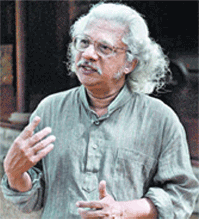Adoor Gopalakrishnan Film Archive and Research Center inaugurated.
By Peter Attipetty
MILWAUKEE: The Adoor Gopalakrishnan Film Archive and Research Center was inaugurated at the film department of the Peck School of Arts at the University of Wisconsin-Milwaukee, last month.

Goplakrishanan – known internationally as the “Poet Laureate of Indian Cinema” – was present at the occasion said that the Center was a great acknowledgement of his work over the last 40 years. He recalled that when asked “Why did you choose Milwaukee?” during an interview that morning, he replied, “Milwaukee chose me.”
Gopalakrishnan’s third film, Rat Trap, that received the prestigious British Film Institute Award (1982), was screened and an active discussion between the audience and the auteur followed, after the inauguration.
Gopalakrishnan is no stranger to Milwaukee. This is the fifth time he is visiting Milwaukee during the last 10 years. He was here earlier this year in March, after participating in the Maximum India festival in Washington D.C. At that time, two of his internationally acclaimed films Shadow Kill and Four Women were screened at Milwaukee Area Technical College, and he engaged in active discussions with students and faculty.
“He is an interdisciplinary artist and very much like what UWM is all about,” said Daniel Kelly, a lecturer in the film department entrusted with the work on the Adoor Gopalakrisnan project.
“Without question, the daring, unflinching and uncompromising expressions that are signature to Mr. Gopalakrishnan’s work have had a profound impact on society in India and worldwide,” said Professor Robert Yeo, Chairperson of the UWM Film Department. “With the establishment of this archive on UWM’s campus, we are not only preserving his films, but are also providing our film students – and the entire community – with the unique opportunity to experience and learn from the master filmmaker.”
The Adoor Gopalakrishnan Film Archive at the UWM Film Department will have 35 mm prints of his 11 feature films and many of his documentaries. UWM film students who pursue filmmaking in the spirit of social justice, a familiar theme in many of his films, will be eligible to compete for an Adoor Gopalakrishnan scholarship at the film department.
What transpired in Milwaukee was a continuation of the cultural event at the University of Chicago which also felicitated the Adoor legacy in Indian cinema. Coinciding with the inauguration, a conference, “Celebrating 100 Years of Indian Cinema” was organized by the University of Chicago last month, as well as a retrospective of his films.
Four films—Mathilukal (The Walls, 1990), Vidheyan (The Servile, 1993), Elippathayam (Rat Trap, 1981), and Nizhalkkuthu (Shadow Kill, 2002) were screened at the retrospective.
In recent decades, “the face of Indian cinema has transformed completely,” said conference co-organizer Rochona Majumdar, associate professor in South Asian Language and Civilizations.
“Gopalakrishnan is closely associated with India’s new wave movement, which emerged in the mid-20th century. Indian new wave was both deeply local and extremely global. New wave filmmakers were influenced not only by European art film, but also by their country’s tumultuous post-independence period,” stated Majumdar.
Accolades and acceptance continue to follow Goplakrishnan. Retrospectives of his films have been held at the Smithsonian in Washington, Cinematheque in Paris, Lincoln Center in New York, La Rochelle, Pesaro, Fribourg, Alexandria, Helsinki, Figuera de Foz, Brussels, Madrid, Lyons, and Ljubljana.
He has received accolades and tributes in almost all major international film festivals. In addition to the prestigious British Film Institute Award (1982), he won the FIPRESCI awards six times consecutively. While the Government of India honored him with the titles Padmashri and Padma Vibhushan, the French Government decorated him with the title of The Cammander of the Order of Arts and Letters. In 2006, the Government of India bestowed on him Dada Saheb Phalke Award for life time achievement in cinema.
The retrospective at the University of Chicago and the establishment of the Adoor Gopalakrishnan Film Archive and Research Center at UWM should be seen as testimonials of active and ongoing enthusiasm for Adoor cinema. (Global India Newswire)
To contact the author, e-mail: editor@americanbazaaronline.com


